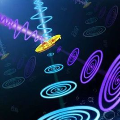The future of quantum computing architecture is most likely the one in which a large number of clients are either fully classical or have a very limited quantum capability while a very small number of servers having the capability to perform quantum computations and most quantum computational tasks are delegated to these quantum servers. In this architecture, it becomes very crucial that a classical/semi-classical client is able to keep the delegated data/ computation secure against eavesdroppers as well as the server itself, known as the blindness feature. In 2009, A. Broadbent et. al proposed a universal blind quantum computation (UBQC) protocol based on measurement-based quantum computation (MBQC) that enables a semi-classical client to delegate universal quantum computation to a quantum server, interactively and fetch the results while the computation itself remains blind to the server. In this work, we propose an implementation (with examples) of UBQC in the current quantum computing architecture, a fully classical client, a quantum server (IBM Quantum) and the computation does not proceed interactively (projective measurement basis is not decided by previous measurement outcome). We combined UBQC with the 8-state remote state preparation (RSP) protocol, to blindly prepare the initial cluster state, which is an initial resource state in UBQC protocol, to allow a completely classical client to perform delegated blind quantum computation. Such an implementation has already been shown to be secure in a game-based security setting, which is the weakest security model.
翻译:暂无翻译




